- Home
- Jude Hardin
THE JACK REACHER FILES: HOSTAGE
THE JACK REACHER FILES: HOSTAGE Read online
About THE JACK REACHER FILES: HOSTAGE
Jack Reacher…
Former army major, military police, the 110th Special Investigations Unit. Now a drifter and a trouble magnet.
Caminha Sozinho…
Assassin for hire. An expert marksman when distance is called for, but prefers the intimacy of a sharp blade. After failing on his first attempt, he must kill Reacher now or face death himself.
The trap…
In a small Colorado town, just west of the Kansas border, a police officer goes missing shortly after finishing her shift. Will Jack Reacher come running when he hears that an old friend is in trouble?
THE JACK REACHER FILES
HOSTAGE
JUDE HARDIN
Table of Contents
Chapter 1
Chapter 2
Chapter 3
Chapter 4
Chapter 5
Chapter 6
Chapter 7
Chapter 8
Chapter 9
Chapter 10
Chapter 11
Chapter 12
Chapter 13
Chapter 14
Chapter 15
Chapter 16
Chapter 17
Chapter 18
Chapter 19
1
The last thing Caminha Sozinho remembered was a fat black gun barrel pointed at his face.
He opened his eyes.
He was flat on his back on a king size mattress. Blurred vision, throbbing headache, sharp stinging pain on the right side of his neck. He touched the center of his forehead with the tips of his fingers, felt the hard knot that had formed there, wondered why he wasn’t dead.
He raised his head and looked around, felt a wave of nausea come and go. He was still in the motel room he’d rented after leaving the CHOKE compound. The man in the black leather jacket—the man who’d hired him for the hit—was sitting on the foot of the bed switching television channels with the remote control. He stopped on an old cowboy movie.
“What time is it?” Sozinho said.
“It’s night. After ten o’clock. You’ve been out for a few hours.”
Sozinho had accepted a large sum of money to assassinate a former army officer named Jack Reacher. He thought he’d been successful, but apparently that wasn’t the case. Apparently he’d shot the wrong man. He’d expected the man in the black leather jacket to kill him and take the money back. Now he wondered if some sort of fate worse than death awaited him. Daily torture sessions, perhaps. He’d heard rumors that the organization the man in the black leather jacket belonged to did such things just for entertainment sometimes.
“Why am I still alive?” Sozinho said.
“You’re still alive because you’re one of the best hit men in the world. I’ve been on the phone with my associates, and we’ve decided to give you another chance at Jack Reacher.”
“Good. I’ve never made a mistake like this before, and I can assure you it won’t happen again.”
The man in the black leather jacket nodded. “I know it won’t happen again,” he said. “But your carelessness has delayed what should have been a relatively simple assignment. Reacher’s going to be expecting something to happen now. He knows that he has been targeted for some reason. He’s going to be twice as difficult to locate, and it’s going to be twice as difficult to achieve the results we were expecting. We could wait until the smoke clears, but it might be a long time before we could go after him again in any sort of conventional fashion. We don’t want to wait, so we’re going to have to draw him out, lure him into coming to us. Which brings me to the real reason you’re still alive. We have another job for you.”
“Another job?” Sozinho said.
“Yes. And since you botched the first one so spectacularly, we’re going to expect you to do this one for free.”
“Of course,” Sozinho said, although he had no intention of doing anything for free. He’d been doing this kind of work for a long time, and his services were in high demand. He would listen to what the man in the black leather jacket had to say, pretend to accept the assignment, and then simply disappear to one of his homes abroad. It didn’t matter that he would never be able to work in the United States again. There were plenty of opportunities elsewhere.
And it wasn’t his fault that he’d shot the wrong man. Not altogether. The sketchy intelligence he’d received was partly to blame. So why should he take on a new assignment with no compensation? It just wasn’t going to happen.
The man in the black leather jacket turned the volume up on the television.
“You might be thinking that you can slink away to a place where we won’t find you,” he said. “You might be thinking about leaving the country and never coming back. If that’s what you’re thinking, then you need to think again.”
“I would never consider such a thing,” Sozinho said. “You must not know me very—”
“Touch the right side of your neck. Be gentle about it. I wouldn’t want you to start bleeding again.”
Sozinho brushed his fingertips across the area of his neck where he’d been experiencing some discomfort, felt a square of gauze held on with two strips of tape.
“What have you done to me?” he said.
“Just a minor surgical procedure. Local anesthesia. It only took a few minutes.”
A rage boiled up inside Sozinho. He wanted to jump to the foot of the bed and wrap his fingers around the man in the black leather jacket’s throat.
“What kind of—”
“It’s a tiny electronic circuit, a disk no larger than a headache tablet. I placed it under your right carotid artery, and now I’m going to activate it.”
The man in the black leather jacket pulled a phone out of his pocket, flipped it open and punched in a number.
Sozinho climbed out of bed and staggered to the bathroom. He peeled off the dressing and looked at the wound on his neck in the mirror. The incision was about half an inch long, closed and tied off with several blood-crusted stitches. The skin surrounding the site had been shaved, and it was stained orange from the solution used to clean it. Whatever anesthesia the man in the black leather jacket had used was starting to wear off, the pain becoming more and more intense as the minutes went by.
This was outrageous. There was no way Sozinho was going to let the man in the black leather jacket get away with this horrendous assault.
He grabbed the straight razor he’d used to shave with earlier and stomped back out toward the bed, intending to perform a little surgery of his own, but the man in the black leather jacket had already moved to the little round table by the window. He was sitting there picking his teeth with one hand and pointing his pistol at Sozinho with the other.
“I know you’re not going to shoot me,” Sozinho said.
“How do you know that?”
“There’s someone in the room next door. I heard the toilet flushing when I was in the bathroom. Your gun will make a loud noise, even with the sound suppressor on the barrel. I will shout out that I’ve been shot, and the person in the room next door will call the police.”
“I could drill one in your forehead from where I’m sitting,” the man in the black leather jacket said. “You wouldn’t have time to shout. Yes, the gun will make a noise, but anyone who hears it will probably think it came from the television. I doubt if anyone will call the police. But even if someone does, I will be long gone by the time they get here. I don’t want to shoot you, but I will if I have to.”
“Take this thing out of me, or I’m going to take it out myself.”
“That would be unwise. In slightly less than twenty-four hours, a signal will be sent from my cell phone to the device implanted
in your neck. Your entire body will be electrified for a moment, and then a smaller charge will burn a hole in the artery that supplies blood to the right side of your brain. Death won’t be quite instantaneous. You’ll feel the warm oxygenated blood trickling internally as the darkness slowly engulfs your consciousness. Any attempt to remove the device will trigger the process automatically.”
“I have the contacts and the money to make you disappear very quickly,” Sozinho said. “All I have to do is make one phone call.”
“That would also be unwise. I’m the only person on the planet who knows the code to deactivate the circuit. If anything happens to me—or if you’re not successful with the assignment—you’ll be dead by this time tomorrow.”
“You expect me to coordinate a hit in less than twenty-four hours?”
“It’s not a hit. It’s a kidnapping.”
“I don’t do that,” Sozinho said.
“Now you do.”
Sozinho was angrier than he’d ever been in his life. He felt as though he’d gone spinning into some sort of elaborate nightmare that he couldn’t wake up from.
“Who am I supposed to abduct?” he said.
“A certain police officer. I’ll tell you all about it in a little while.”
“You want me to locate and kidnap a cop in less than twenty-four hours?”
“Don’t worry. The officer will come to you. You’ll be arrested, and then you’ll escape. I’m going to give you a key that fits ninety-five percent of the handcuffs manufactured worldwide.”
“Ninety-five percent? What if this particular cop has a pair of cuffs from the five per cent that the key won’t open?”
“Then you will die in a jail cell.”
“You’re kidding, right? You really think I’m going to—”
“A few hours ago, you thought your chances of living were zero. You should be pleased with the current odds.”
The man in the black leather jacket was right. Earlier that afternoon Sozinho had expected a bullet in the brain for failing to kill Jack Reacher. At least now he had an opportunity to make it out of this alive.
He sat on the edge of the mattress. “This is unnecessary,” he said, pointing to the surgical wound on his neck. “I’m a professional, and you’re treating me like—”
“Let’s just call it insurance. And maybe you’ll do a better job this time knowing that your life depends on it.”
Sozinho didn’t want to die, but he also didn’t want to provide his services for free. Not that he needed the money. It was a matter of principle.
Kidnapping wasn’t his thing, but he didn’t think it would pose much of a problem as long as he had the right tools. He would go ahead with the assignment. The man in the black leather jacket had left him no choice. He would do the job, but then he would get his payment one way or another.
Perhaps in cash.
Perhaps in blood.
“Tell me what you want me to do,” Sozinho said.
“Get your things together. You’ll be flying to Hope, Colorado in a private jet. I’ll tell you more about the job on the way to the airport.”
2
Officer Vaughan turned left on Second Street, steered her cruiser into the diner’s parking lot, found a place in front near the door and killed the engine. She climbed out and walked inside and took a seat in her usual booth. It was 7:17 in the morning, and the place was busy with breakfast customers, but the staff always kept this table by the window open for cops. It was their way of thanking the department for the service they provided to the community.
Exhausted from the twelve-hour shift she’d just pulled, Vaughan looked forward to going home and getting some sleep and then being off for two days. She wanted to be in bed by nine so she could get up and enjoy the afternoon and evening. She liked her work, but she liked her time away from it as well. Work hard, play hard. That had become her philosophy over the past few years.
It had been an uneventful night for the most part, just one domestic call and one citation for reckless driving. Hope was a boring little town out in the middle of nowhere, and Vaughan liked it that way.
A waitress stepped up to the table with a menu and a glass of ice water.
“Coffee?” she said.
“Decaf. And I’m ready to order.”
“Okay.”
“Two eggs over easy. Bacon, hash browns, toast. I want the bacon extra crispy.”
“Anything else?”
“No. That’s all.”
“Okay. I’ll be right back with your coffee.”
“Thanks.”
Vaughan stared out the window, watched the teenagers walking by on their way to class. There were some couples holding hands and some groups acting silly and some studious types carrying backpacks weighted with thick textbooks. Some of the kids appeared to be stressed out for one reason or another, and some wore sad expressions, and some sauntered along with cigarettes and attitudes, trying to look tough. Vaughan wanted to grab each and every one of them by the shoulders and tell them that the choices they made now were likely to affect them for the rest of their lives, that they would only be young once, that they should make the most of their years in school. She wanted to tell the slackers to buckle down and stay in school and get their diplomas, and she wanted to tell the super-ambitious students to take a little time to enjoy their youth, to do something completely frivolous now and then.
Work hard, play hard.
She wanted to tell every one of them that one day they would wake up and be forty and wonder where the time had gone.
She wanted to tell them all those things, although she knew that most of them wouldn’t listen. No more than she would have at that age.
The waitress brought a mug to the table and filled it with decaf from a Bunn decanter with an orange spout. She told Vaughan that her food would be out shortly.
“New here?” Vaughan said.
“Actually, this is my first day. But I’ve waited tables before. I’ll be right back with your breakfast, okay?”
Vaughan nodded, and the young lady walked away. Nineteen, maybe twenty. Short brown hair and a pretty face. She wasn’t wearing a nametag. Maybe the manager hadn’t had time to make her one yet.
The high school kids had made their way past the diner, and the sidewalk outside the window was deserted now except for the occasional restaurant patron coming or going or the occasional employee or owner arriving to open one of the other businesses on Second Street. Vaughan was winding down, mentally and physically, but for most of Hope’s population—and indeed for most of the population in this part of the country—the day was just getting started.
The waitress with no nametag delivered Vaughan’s bacon and eggs and hash browns and toast. She filled Vaughan’s coffee mug and asked if there would be anything else right now.
“This is fine,” Vaughan said. “Thank you.”
The waitress smiled and walked away.
Vaughan dabbed one of the bacon strips on the edge of her plate with the corner of a napkin to soak up some of the grease, and then she picked it up and took a bite. It wasn’t quite crispy enough, not as crispy as she cooked her bacon at home, but it was okay. She picked up her fork and cut into her eggs, looked out the window and saw a guy with a can of spray paint writing something on the sidewalk.
A county employee marking the pavement for a new sign, perhaps, although he wasn’t wearing any sort of uniform—not even one of the orange safety vests they always wore when automotive traffic was a concern. Vaughan watched him for a few seconds, saw him move to the corner where he started spraying red blotches on the fire hydrant.
Vaughan dropped her fork on the plate, scooted out of the booth and walked outside. As she approached the man with the spray paint, he tossed the can aside and disappeared around the corner.
Vaughan followed, shouted to him from a few feet behind.
“Excuse me, sir.”
The man stopped and turned around.
“Can I help you, officer?
”
“I was just wondering why you were painting the sidewalk and the hydrant back there.”
“I wasn’t.”
“I saw you through the window at the diner. It was definitely you.”
“I’m afraid you’re mistaken. I was just walking along minding my own business.”
The man wore faded jeans and a flannel shirt with the sleeves torn off. He wasn’t big, five-nine or five-ten, maybe a hundred and sixty pounds, but the muscles in his arms were well-defined, most likely from some sort of hard work rather than time at a gym. Bloodshot eyes, whiskey breath. He didn’t appear threatening at the moment, but Vaughan kept her distance just the same.
“Got some ID on you?” she said.
“No.”
“Sir, I just finished a twelve-hour shift, and I really don’t feel like spending the next two hours processing you through the system, so if you’ll just follow me over to the hardware store, we’ll get some paint thinner and you can—”
“I’m not going to follow you anywhere,” the man said.
Vaughan shook her head in disbelief. She unhooked the set of cuffs attached to the back of her gun belt, rested one hand on a canister of pepper spray and the other on the grips of her pistol, ready to use whatever force was necessary if the guy tried to resist.
“Put your hands on the wall and spread your legs apart,” she said. “You’re under arrest for public intoxication and the destruction of county property.”
“Yes ma’am.”
Surprisingly, the man complied with Vaughan’s instructions without any argument. Maybe he thought jail wouldn’t be too bad for a while. A warm place to sleep and three hot meals every day. She felt sorry for him, but she couldn’t just let him go. In his present state, he was a danger to himself and to the community.
“You have some kind of injury?” Vaughan said.
There was a gauze dressing taped to the right side of his neck, a couple of inches above his collar bone, pink in the center where a small amount of blood had started to seep through.
“Don’t worry about it,” the man said.
Vaughan cuffed his wrists behind his back and patted him down. His pockets were empty. Nothing. Not even a gum wrapper. She led him to the diner’s parking lot, guided him into the back seat of her cruiser and shut the door.

 Ricochet: The Jack Reacher Experiment Book 8
Ricochet: The Jack Reacher Experiment Book 8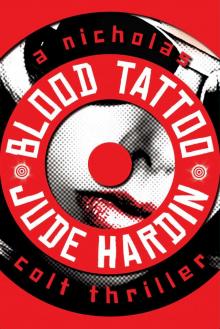 Blood Tattoo (A Nicholas Colt Thriller Book 5)
Blood Tattoo (A Nicholas Colt Thriller Book 5) Racked (A Lt. Jack Daniels / Nicholas Colt mystery)
Racked (A Lt. Jack Daniels / Nicholas Colt mystery)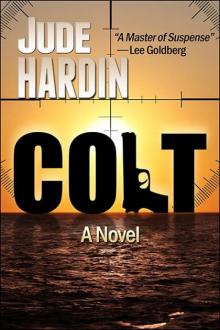 COLT (A Nicholas Colt Thriller)
COLT (A Nicholas Colt Thriller)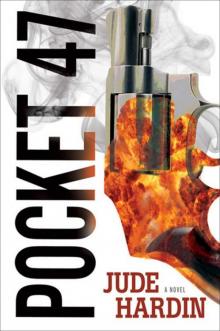 Pocket-47 (A Nicholas Colt Thriller)
Pocket-47 (A Nicholas Colt Thriller)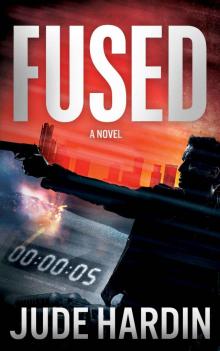 FUSED: iSEAL OMNIBUS EDITION (A Military Technothriller)
FUSED: iSEAL OMNIBUS EDITION (A Military Technothriller) THE JACK REACHER FILES: CHOKE 2 (Episode 2 in the CHOKE Series)
THE JACK REACHER FILES: CHOKE 2 (Episode 2 in the CHOKE Series)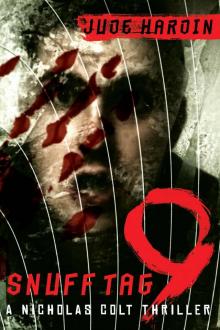 Snuff Tag 9 (A Nicholas Colt Thriller Book 3)
Snuff Tag 9 (A Nicholas Colt Thriller Book 3) THE JACK REACHER FILES: HOSTAGE
THE JACK REACHER FILES: HOSTAGE THE JACK REACHER FILES: THE GIRL FROM THE WRONG SIDE OF CORDIAL (with Bonus Thriller THE BLOOD NOTEBOOKS)
THE JACK REACHER FILES: THE GIRL FROM THE WRONG SIDE OF CORDIAL (with Bonus Thriller THE BLOOD NOTEBOOKS)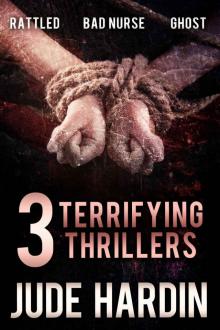 3 TERRIFYING THRILLERS
3 TERRIFYING THRILLERS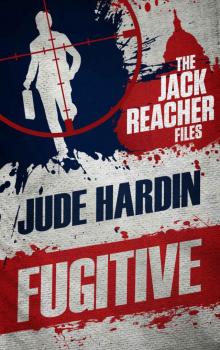 The Jack Reacher Files: Fugitive
The Jack Reacher Files: Fugitive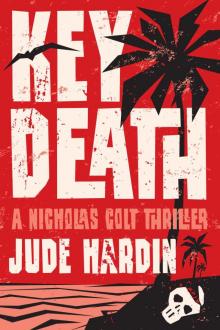 Key Death (A Nicholas Colt Thriller Book 4)
Key Death (A Nicholas Colt Thriller Book 4) SYCAMORE BLUFF (Prequel to THE JACK REACHER FILES: ANNEX 1) (A Nicholas Colt Thriller Book 8)
SYCAMORE BLUFF (Prequel to THE JACK REACHER FILES: ANNEX 1) (A Nicholas Colt Thriller Book 8) VELOCITY
VELOCITY Fire and Ice
Fire and Ice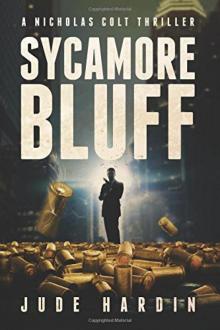 Sycamore Bluff
Sycamore Bluff Jack Reacher Files_Velocity
Jack Reacher Files_Velocity 357 Sunset
357 Sunset THE JACK REACHER FILES: CHOKE (Episode 1 in the CHOKE Series)
THE JACK REACHER FILES: CHOKE (Episode 1 in the CHOKE Series)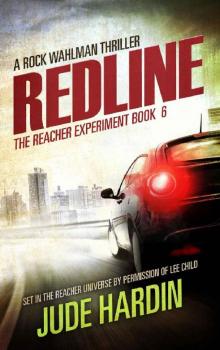 Redline: The Reacher Experiment Book 6 (The Jack Reacher Experiment)
Redline: The Reacher Experiment Book 6 (The Jack Reacher Experiment)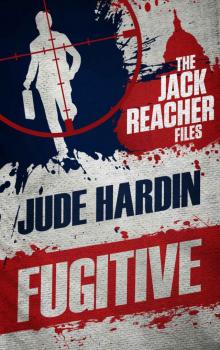 Fugitive
Fugitive Fire and ice dm-8
Fire and ice dm-8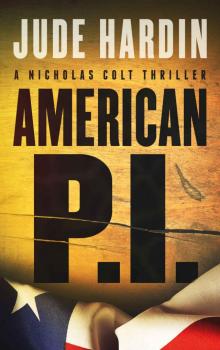 American PI
American PI THE JACK REACHER FILES: ANNEX 1 (A Novel of Suspense)
THE JACK REACHER FILES: ANNEX 1 (A Novel of Suspense) THE JACK REACHER FILES: VELOCITY (with bonus thriller CROSSCUT)
THE JACK REACHER FILES: VELOCITY (with bonus thriller CROSSCUT) The Reacher Experiment
The Reacher Experiment Hostage
Hostage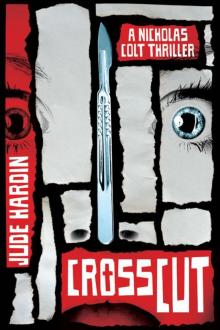 Crosscut (A Nicholas Colt Thriller Book 2)
Crosscut (A Nicholas Colt Thriller Book 2) Lady 52: A Jack Daniels/Nicholas Colt Novel
Lady 52: A Jack Daniels/Nicholas Colt Novel